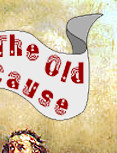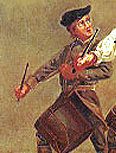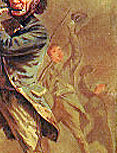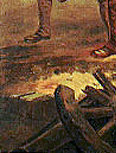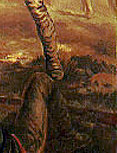FROM
ENGLISH LAW TO NATURAL LAW TO RADICAL INDIVIDUALISM
Spooner’s
lifetime saw many important changes in American life.
Born in Massachusetts in 1808, he grew up in a largely
free society whose constituent republics were united
on the basis of consent. By the time he died in 1887,
he had seen the central state strengthened by fire
and sword, 1861-1865, and the union shifted to a basis
of naked force.1 The whole time,
however, it was maintained by those in authority that
nothing substantial had really changed. As Joseph
Sobran likes to say, this is apparently what it means
to have "a living Constitution." Having
early turned a critical eye on government, Spooner
had become a critic of the Constitution even as that
document underwent some of its major sea-changes.
Spooner
read law in the 1830s under the old apprentice system
in which an aspiring lawyer worked for established
jurists while learning the law. It has been argued
that the old way produced better lawyers than the
modern system of formal law schools overseen by organized
lawyers’ cartels in each state.2
As it was, Spooner had to wage a campaign against
a state law which anticipated the "professionalization"
of law by requiring three additional years’ study.
He won but betook himself to Ohio to practice law.
Spooner
opened up a private postal business in 1844. Congress
put him out of business, by statute, in 1845. Spooner
was learning quite a lot about government. He drew
some conclusions in his essay, Poverty: Its Illegal
Causes and Legal Cure (1846):
"Nearly
all the positive legislation that has ever been passed
in this country, either on the part of the general
or state governments, touching men’s rights to labor,
or their rights to the fruits of their labor… has
been merely an attempt to substitute arbitrary for
natural laws; to abolish men’s natural rights of labor,
property, and contract, and in their place establish
monopolies and privileges; to create extremes in both
wealth and poverty; to obliterate the eternal laws
of justice and right and set up the naked will of
avarice and power; in short, to rob one portion of
mankind of their labor, or the fruits of their labor,
and give the plunder to the other portion."3
These
were the words of a consistent "bourgeois"
individualist, not a call for socialist upheaval.
Spooner’s views resembled those of Jacksonian radicals
like William Leggett and echoed the social-welfare
analysis of French laissez faire liberals, whose analysis
of politics as legitimized "plunder" and
"spoliation" provided a theory of "class
struggle" radically opposed to Marxism. While
some of the pure economic analysis in Spooner’s works
may be faulty,4 the larger framework
is not.
THE
CONSTITUTION, SLAVERY, AND THE CONSTITUTION RECONSIDERED
As
someone who cared more about freedom than any other
value, Spooner allied himself with the abolitionist
movement. He increasingly came to define law as "an
intelligible principle of right" deriving from
natural law. This led him to a number of disputes
with prominent abolitionist leaders like William Lloyd
Garrison, who was denouncing the Constitution as a
covenant with death and hell which deserved instant
repudiation.
Against
the Garrisonians, Spooner sought to show that slavery
contradicted both English law and natural law in The
Unconstitutionality of Slavery (in two parts,
1845 and 1846). This rather eccentric argument apparently
persuaded few people. Following his chosen path of
working out the radical implications of the grounds
of English law, Spooner published in 1852 his Trial
By Jury. Reviewing the history of the jury
system, he concluded that all statute law claiming
to improve upon or overthrow the common law was ipso
facto invalid. Further: "If the real trial
by jury had been preserved in the courts of the United
States – that is, if we had had legal juries, and
the jurors had known their rights, – it is hardly
probable that one-tenth of the past legislation of
Congress would have ever been enacted, or at least,
that, if enacted, it could never have been enforced."5
SPOONER’S
POST-CONSTITUTIONAL VIEWS
Having
done his damnedest to reconcile English law and the
US Constitution with natural law, Spooner threw over
the whole undertaking in No
Treason: The Constitution of No Authority
(1870).6 By then, the
world had seen how the last great hope of mankind
– that is, the Yankee government – had responded to
the secession of a number of the constituent states
making up the federation over which that government
presided. Applying with unwavering consistency the
principle of "methodological individualism"
to the realm of the law, Spooner held that only real
individuals or their properly appointed agents could
act, make contracts, and take on binding legal obligations
and duties.
None
of these conditions held with the US Constitution.
At best, it was a signed agreement between the men
who wrote it (and perhaps those who ratified it).
By now, they were all dead, and the Constitution,
therefore, bound no one but merely served as the basis
of ongoing political imposture and fraud. The crushing
of Southern independence underscored this reality.
I
shall not ask everyone to take this strong medicine,
much less believe it. Some of us, after all, harbor
a certain sentimental attachment to the old document
and cringe every time the Nine Delphi deconstruct
and reinvent it. No matter. Spooner’s radical consistency
is wonderful to behold, even for those chary of buying
into it. We can leave the matter to his readers, for
now.
GOVERNMENT,
DEBT, AND WAR
Seeing
that governments are not the agents (certified in
writing) of actual rights-bearing persons and that
they do not conduct themselves as hired protectors
or genuine insurance agencies, Spooner naturally asks
Who is it, exactly, that governments do protect? His
conclusion is a Rothbardian one – or, since Spooner
came first, one can say that Rothbard extended the
Spoonerian argument – namely, that governments
protect themselves, that is, those persons who comprise
them, and those interests allied with those persons.
I hope Dan Rather mentions that on the evening news
sometime. It would be a big scoop for whichever network
airs it first.
Spooner
had been such a radical abolitionist that he busied
himself with schemes to make "private war"
against the slaveholders of the South. Yet, when the
war came, he joined that minority of abolitionists
who did not support it.7 Spooner’s
lack of trust in government had so far matured that
he felt morally bound to oppose organized state war,
whatever its alleged purposes.
In
any case, Spooner did not accept that the war had
been fought "to free the slaves." He saw
that as an after-the-fact apology brought in later
to justify mass slaughter and centralized tyranny.
He would have agreed with Jeffrey Rogers Hummel that
the war was about two things: Emancipating
Slaves, Enslaving Free Men (1997).
Spooner
stressed how the government-allied bankers had made
a hateful war possible: "This business of lending
blood money is one of the most thoroughly sordid,
cold-blooded, and criminal that was ever carried on,
to any considerable extent, amongst human beings.
It is like lending money to slave traders, or to common
robbers and pirates, to be repaid out of their plunder.
And the men who loan money to governments, so called,
for the purpose of enabling the latter to rob, enslave,
and murder their people, are among the greatest villains
that the world has ever seen."8
The
bankers had never complained about slavery in the
South – they had indeed been its great supporters
– but secession presented them with a dilemma. They
backed Lincoln’s war "for a purely pecuniary
consideration, to wit, a control of the markets
in the South, in other words, the privilege of holding
the slave-holders themselves in industrial and commercial
subjection to the manufacturers and merchants of the
North."9 The result was a
monstrous neo-mercantilist system resting on national
debt and tariffs three or four times higher than they
had been before the war, justified by a partial freedom
for the former slaves, a freedom which could have
been gained by other means.
Spooner,
the veteran abolitionist and radical common lawyer,
would not join in the great Northern celebration of
a bloody and costly victory. All the overblown oratory
about having "saved the union" came down
to this: "they have subjugated, and maintained
their power over, an unwilling people…. as if there
could be said to be any Union, glorious or inglorious,
that was not voluntary."10
The war had been fought to establish an absolute sovereignty
of the central government (not that of the people)
over what it claimed as its constituent elements –
and every inch of territory and every person within
those.
CONQUEST
BEGINS AT HOME
It
is critical to realize that the territory and people
which a state offers to "protect and defend"
from other bodies of the same general character have,
as Jeffrey Hummel has pointed out, already been conquered
by that state. Here we have the Law and the Prophets.
If the state is powerful enough, it will try extending
its sway over "its" region and, then, when
megalomania sets in, over the great globe itself.
At that point it makes little difference whether the
state in question permits the sheep and cannon fodder
a voice in choosing their masters or not. The permanent
bureaucracies glide along their path either way –
and the military is above all else a monstrous bureaucracy
(a point many conservatives have a hard time grasping)
– and the sheep hang on for the ride. Besides, as
Spooner put it, the secret ballot establishes an electoral
"conspiracy" whereby some people, under
cover of anonymity, vote to plunder their fellows.
Spooner
knew these things and it is in this way that his writings
on law and government are "about" foreign
policy. Politics does not stop at the water’s edge;
it continues there. Spooner’s critique, which will
strike some folk as extreme and cynical, bespeaks
an exceptional willingness to face what Nietzsche
calls "the awful news" (although Nietzsche
may have had something else in mind). It is owing
to the efforts of the modern libertarian movement
that Spooner is known at all these days – in his homeland
and abroad as well.11
My thanks to the reader who suggested that I discuss
Spooner in this space. I hope the results are not
too disappointing.
And
as far as ransacking English law for radical implications
goes, we can’t leave it all to Bo Gritz and his associates.
Notes


